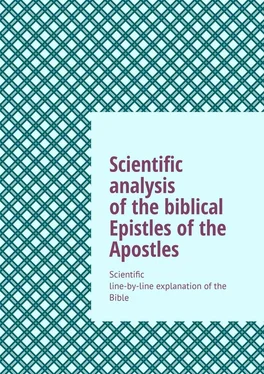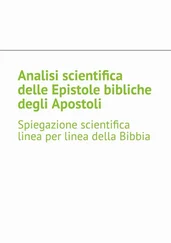1 ...8 9 10 12 13 14 ...18 6 We are of God; he who knows God listens to us; he who is not of God does not listen to us. By this we recognize the spirit of truth and the spirit of error. (Those who are «from God» are «right»).
7 Beloved! let us love each other, because love is from God, and everyone who loves is born of God and knows God. (Propaganda of love).
8 He who does not love has not known God, because God is love. (The statement that God is love).
9 God’s love for us was revealed in the fact that God sent his only Begotten Son into the world so that we would receive life through him. (God Yahweh has an «only begotten son» whom he sent into the world. Personification of the gods).
10 This is love, that we did not love God, but he loved us and sent his Son to propitiate for our sins. (Yahweh sent his son to the slaughter to atone for the sins of all people. «It was inherent in all ancient religions that a sin before the deity should be redeemed by a propitiatory sacrifice. And every single person could not help but realize that he was „not without sin.“ The righteous Job had to agree with his opponents that „one born of a woman“ cannot be completely pure before God (Job 25:5). But let us remember that the same Job laid the blame for this on the creator of people: „Is it good for you that you oppress, that you despise the work of your hands?“ (10:3). God himself, who created them, is to blame for the imperfection of people. God was not justified before Job. In Christianity, God was justified. He justified himself by offering a great redemptive sacrifice – his „only begotten“ son – for the „unclean“ and sinful humanity that he had created. With this sacrifice, God redeemed the sins of people, but also his guilt. Redeemed… to whom? In front of you? Illogic? Of course! But, as Engels rightly observes, „in the sacrificial death of its founder, Christianity created an easily understandable form of inner salvation from a corrupt world, consolation in consciousness, which everyone so passionately aspired to,“ and thus Christianity „proved its ability to become a world religion – moreover, a religion that corresponds just to this world.“ This act – a kind of self – justification of the deity – in Christianity, in essence, ended the process of theodicy, the justification of God. God has opened a „way out“ and a „way to salvation“ for suffering humanity.» – writes M. I. Riszski «Biblical Prophets and Biblical Prophecies», pp. 327—328).
11 Beloved! if God has loved us so much, then we should love each other too. (Talion’s rule, God has loved, then it is impossible not to love him).
12 No one has ever seen God. If we love each other, then God abides in us, and His love is perfect in us. («No one has ever seen God,» the author claims, so there is no God! And people love each other without any gods).
13 That we abide in him and he in us, we learn from what he has given us from his Spirit. («The presence of someone in something» is possible only by suggestion – «Spirit»).
14 And we have seen and testify that the Father sent the Son as the Savior of the world. (Personification of the gods: God the father and God the son).
15 Whoever confesses that Jesus is the Son of God, God abides in him, and he is in God. (It is necessary to assert that «Jesus is the Son of God, God abides in him, and he is in God»).
16 And we have known the love that God has for us, and have believed in it. God is love, and he who abides in love abides in God, and God in him. (God is love).
17 Love reaches such perfection in us that we have boldness in the day of judgment, because we act in this world like him. (God is love).
18 There is no fear in love, but perfect love casts out fear, because there is torment in fear. The one who is afraid is imperfect in love. (God is love).
19 Let us love him, because he first loved us. (God is love).
20 Whoever says, «I love God,» but hates his brother, is a liar: for he who does not love his brother, whom he sees, how can he love God, whom he does not see? (It is necessary, in addition to loving God, to love your fellow brothers).
21 And we have such a commandment from him that he who loves God should also love his brother. (It is necessary, in addition to loving God, to love your fellow brothers).
Chapter 5
1 Everyone who believes that Jesus is the Christ is born of God, and everyone who loves the one who gave birth also loves the one born of him. (An indication of who is considered a believer, those. who believes that «Jesus is the Christ, born of God, and everyone who loves the One who gave birth also loves the One born of Him»).
2 That we love the children of God, we learn from when we love God and keep his commandments. (The «Children of God» are obliged to love Yahweh and observe the commandments of God, that is, the Jewish guidelines-laws).
3 For this is the love of God, that we keep his commandments; and his commandments are not hard. (The love of God is the observance of the commandments of God, that is, Jewish attitudes-laws).
4 For whosoever is born of God overcomes the world; and this is the victory that overcomes the world, our faith. (Faith is suggestion, and then self—suggestion, the «children of God» are fellow brothers of the nascent Christianity).
5 Who conquers the world but he who believes that Jesus is the Son of God? (It is necessary to believe «that Jesus is the Son of God», since there is no evidence).
6 This is Jesus Christ, who came by water and blood and Spirit, not only by water, but by water and blood, and the Spirit testifies of [him], because the Spirit is the truth. (Sacred entities – water, blood, Spirit (hypnotic trance).
7 For three bear witness in heaven: the Father, the Word, and the Holy Spirit; and these three are one. (These words are absent from the early biblical texts and are probably a later insertion designed to confirm the dogma of the Trinity).
8 And three bear witness on earth: spirit, water, and blood; and these three are of one. (Sacred entities – water, blood, Spirit (hypnotic trance).
9 If we accept the testimony of men, the testimony of God is greater, for this is the testimony of God, by which God testified about his Son. (The personification of God who «testifies» to something).
10 He who believes in the Son of God has a testimony in himself; he who does not believe God presents him as a liar, because he does not believe in the testimony by which God testified about his Son. (Personification of God, who «testifies» about his son).
11 This testimony is that God has given us eternal life, and this life is in his Son. (Yahweh has «given us eternal life, and this life is in His Son.» Jesus is supposedly eternally alive)
12 He who has the Son (of God) has life; he who does not have the Son of God has no life. (The contrast of those who have the «Son of God» and those who do not).
13 I have written these things to you who believe in the name of the Son of God, so that you may know that you, believing in the Son of God, have eternal life. (The statement that believers in the «Son of God» have supposedly eternal life).
14 And this is the confidence we have in him, that when we ask anything according to his will, he listens to us. (Personification of God the son).
15 And when we know that He listens to us in whatever we ask, we also know that we receive what we ask from him. (Personification of God the son).
16 If anyone sees his brother sinning with a sin not to death, then let him pray, and [God] will give him life, [that is] sinning with [sin] not to death. There is a sin to death: I am not saying that he should pray. (Various types of sins, the need for prayer-autosuggestion).
17 Every unrighteousness is a sin; but there is a sin not to death. (Various kinds of sins).
Читать дальше












